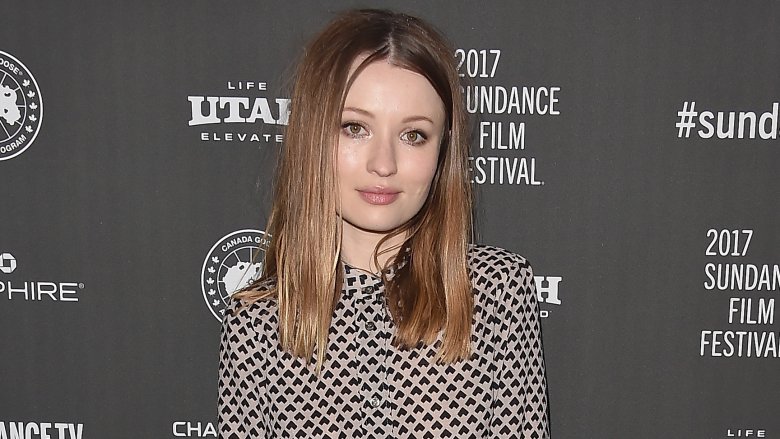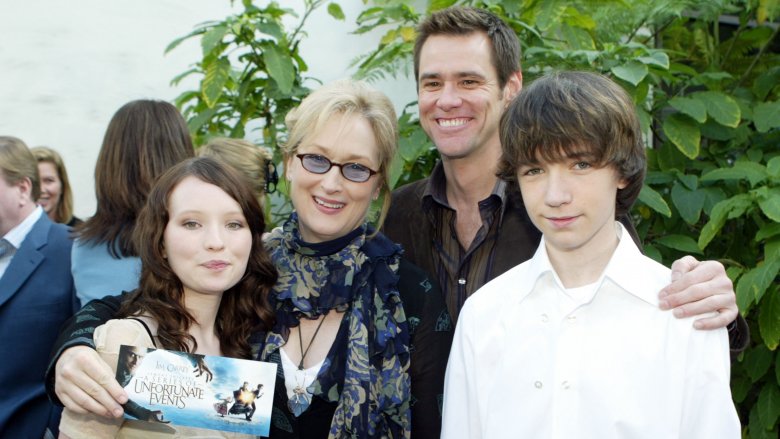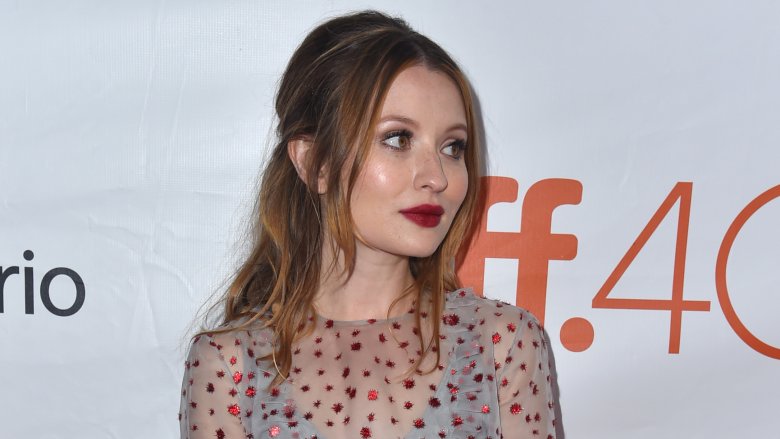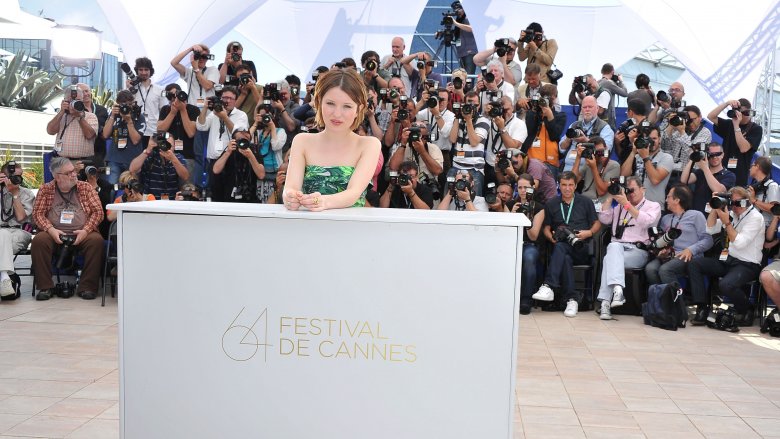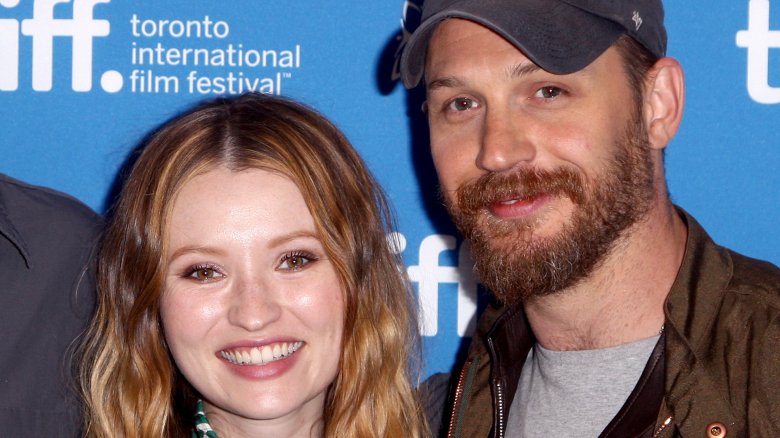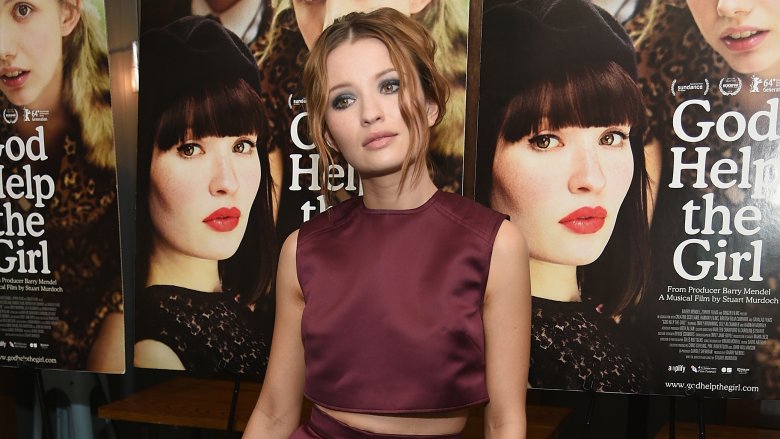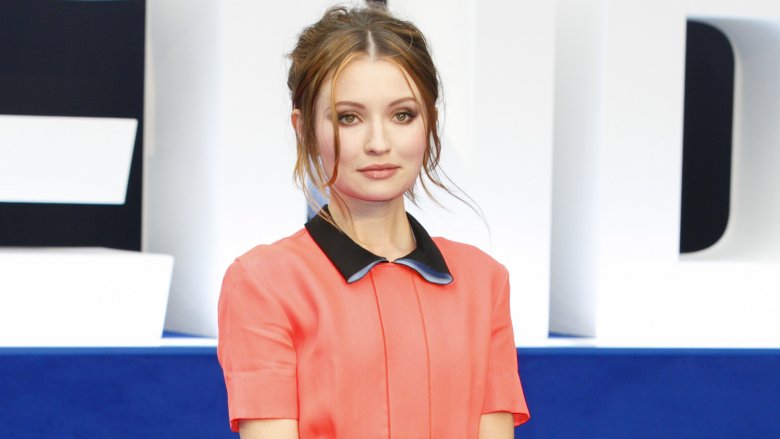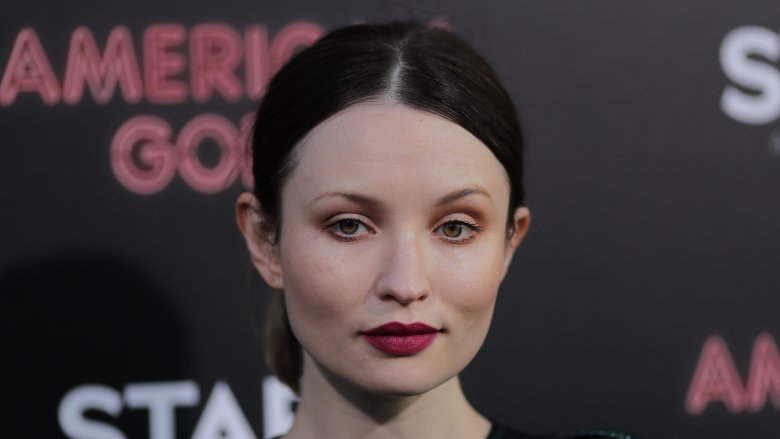Why Hollywood Left Emily Browning Behind
At 14-years-old, Emily Browning was already a regular on Australian TV when she was cast in Lemony Snicket's A Series of Unfortunate Events in 2004. Acting opposite A-listers like Jim Carrey and Meryl Streep, Browning basically hit a home run on her first at-bat in the Hollywood scene. But then it was two years before her next starring role in the much smaller film, Stranded (2006). Then another three until her next role in The Uninvited (2009). As of this writing, Browning has only returned to big studio films twice since her big break despite the fact that she generally gets rave reviews on her performances, so what gives? Here's why Hollywood won't cast Emily Browning anymore.
She's been critical of Hollywood
Not that it's wrong or unusual for an actor to speak his or her mind as far as issues they have with Hollywood, but they're usually not as blunt about it as Emily Browning has been. During promotion for Sucker Punch (2011), the poorly received Zack Snyder slo-mo extravaganza, Browning touched on what she perceives as a problem Hollywood has in its characterization of women. Describing the film to The Georgia Straight, Browning said, "It's something I've never seen before: strong female characters. There's none of the false kind of cattiness that Hollywood sort of believes is innate to all females. I can't stand that girl-hate culture. I think it's so unnecessary and so outdated."
Years later, in a 2015 interview with The Guardian, Browning got even more pointed. She took the whole industry to task, speaking of a pervasive sexism that she says she's experienced as "consistent" and "so present" that she's now actively avoiding it. "I'm so determined not to play the hot babe that doesn't say anything, that can't have an opinion, but it's so difficult to resist all of that. Hollywood movies are made for white men, and that's something I think about and which bothers me all the time," she said. Obviously, comments like that could be alienating, but there are also other, more practical reasons we haven't seen much of Browning lately.
She doesn't like the LA scene
In that same interview with The Guardian, Browning admits that she's not only unimpressed with the business of Hollywood, she's not that into the scene surrounding it either. While living in LA to shoot Lemony Snicket's A Series of Unfortunate Events, Browning discovered an environment of sheltered industry kids whose highest aspiration was to star on a Nickelodeon show, and it actually made her think about giving up on the business altogether. "I saw a world I didn't want to be part of. "I thought, 'No, I can't do this. I need to get out of here.' And for a while, I thought I didn't want to be an actress. That it had been fun for a bit, but it's not for me," she said.
Browning also told The Irish Times that she simply craved normalcy. "I never fell out of love with acting, but I didn't like the world. I didn't want to be a child actor. I missed the high-school environment and feeling like a normal kid," she said. Which is a pretty stunning thing for a 14-year-old to realize if you think about it, since most kids would give their left arm for the chance to trade algebra class for a Hollywood film set.
The big-budget movies she's been in haven't done well
Of Browning's three major studio films, Lemony Snicket's A Series Of Unfortunate Events (2004), Sucker Punch (2011), and Pompeii (2014), it's almost easier to just let the numbers do the talking. Their Rotten Tomatoes ratings are 72%, 23%, and 27% respectively, and according to Box Office Mojo each film barely made its money back, and only when combining domestic and foreign receipts. For example, Sucker Punch, with a budget of $82 million, only made a little over $36 million domestically. That is not great, and although definitely not all on Browning's shoulders, it only takes a few bombs to create the perception that perhaps one is not a blockbuster box office draw. Especially when the critics get out their knives as well.
Though Browning has consistently drawn praise for her performances throughout her career, her films haven't fared so well. Sucker Punch was particularly eviscerated in reviews like one from William Goss of MTV who called it a "faux-profound, quasi-feminist blowout." Time Out London was even harsher, describing the film as "the sad wet dream of a middle-aged man raised on the reductive archetypes of comic-books and computer games." But Browning seemed to shrug off the negative criticism, telling The Irish Times, "I totally get it. I look at that now and I see where we went wrong. It was a fascinating thing to play a character who was objectified, but could go into a fantasy world and terrorize her attackers." Maybe shoot for a little less Evanescence next time?
She made a bold career statement with Sleeping Beauty (2011)
In director Julia Leigh's controversial indie flick, Sleeping Beauty (2011), Browning plays a college student who gets drawn into the seedy world of high-end prostitution. And not only that, but a niche corner of the occupation in which she remains medically unconscious while servicing her clients. That's some pretty dark material, especially considering the Disney association with the title, and it's the kind of role that even Browning knew would come with some lingering baggage.
In an interview with IndieWire, Browning said, "I knew from the word go that there would be people who didn't feel comfortable with it or didn't like it. And that's fine. I've been doing this for a long time, and I stopped worrying about other people's opinions. If people love what I do, that's fantastic. And there's always going to be people who don't, and if I focus on that, then it'll destroy me." From an artist's perspective, this is an admirable stance, but it's easy to see how a studio would look at a statement like that and think they may have a problem getting Browning to do something about which she doesn't feel creatively fulfilled. After all, it's gotta be pretty tough to convince such a "woke" actor that posing for the marketing photos on the collectible Happy Meal cup has some intrinsic artistic value.
She won't work on just any project
Since Browning isn't remotely interested in Hollywood stardom at all costs, she has no problem pressing the pause button and waiting for the right script to come along. She told The Irish Times she read 150 scripts after she starred in Legend (2015) alongside Tom Hardy, only to find that "Often the film is good, but you're playing the girlfriend role." Not surprisingly, she chose Shangri-La Suite (2016), an off-beat indie film about a Bonnie and Clyde-type couple who go on a road trip with the end goal of assassinating Elvis Presley, followed by another super small film, Golden Exits (2017), which made a blip at The Sundance Film Festival, but hasn't done much since.
For Browning, being an actor is less about fame than it is about breaking out of one's comfort zone. Speaking with IndieWire, she said that if her work wasn't challenging, it would be "soul-destroying." She also told indieLondon about what she thinks is an important distinction between movie stars and actors. "I want to be an actor – that's what I want to do and I know that the movie star element has to be there to some degree, so that you have the freedom of choice to make films that you want to make. But that idea of movie star still freaks me out."
She's intimidated by large productions
The set of Lemony Snicket's A Series of Unfortunate Events (2004) must have had a profound effect on Browning, because over 10 years later, she was still citing it as a reason she shied away from bigger studio films. Speaking with Interview, Browning compared the massive Hollywood production to the smaller sets she was used to down under. "I feel like in Australia, all the films I've done, we're all equal moving parts in this equation of making the film—an actor is another crew member, essentially. I liked that," she said. She also mentioned how excessive she felt craft services to be, as well as the fact that there were "trailers with TVs and Nintendos" which she even acknowledges was "a dream for a kid." And she didn't care for how actors would retreat to their trailers in between scenes either, and not "socialize so much with the crew."
Have we made it clear yet that Browning isn't even trying to get Hollywood to like her? Okay, well here's more proof: she even goes so far as to say that being insulated by the Hollywood bubble would make it impossible for her to even do her job as an actor, which she describes as "to portray real human beings and real human experiences," adding, "If I haven't had a real human experience myself outside of the film industry, how am I going to be able to do that?" We get it, Miss Browning, you're a very serious artist.
She's not really that motivated
Back in 2006, Browning was still something of an "It" girl. In fact, she had so much heat that the writer of The Twilight Saga books, Stephanie Meyer, actually wrote on her blog that Browning was her "favorite choice" for the role of Bella. Setting aside the fact that Browning would have probably hated the huge Hollywood atmosphere of those sets, especially for four straight years, she actually admitted that she was "too lazy" to even audition for the role.
"It's not that they asked [me to take the Twilight part], but I couldn't even audition. I was too tired. So, really, it's just a matter of me being lazy." she told MTV. Browning claimed that she was "exhausted," having just wrapped shooting on the 2006 horror flick, The Uninvited, and that she's "not the type of person who can just work back-to-back," which, correct us if we're wrong here, sounds exactly like the privileged Hollywood mindset she claims to reject. And if you think that sounds harsh, go ahead and call your job on a Tuesday morning to say that you won't be in because you're just not the type of person who's into working back-to-back days. Let us know how that goes.
She's turning a corner with American Gods
In a rare move for Browning, she took a role in the highly-anticipated Starz adaptation of Neil Gaiman's novel, American Gods. This is a tentpole project for the premium cable network, meaning huge budget, huge production, and massive publicity. It's everything Browning supposedly eschews about the business, so why the sudden change of heart? According to an interview with EW, Browning's character, Laura, is one of the "coolest characters" she's ever read or played. She also said, "I love that Laura is a jerk. She's a real a–hole. Not only that, but she feels no shame about it," adding, "I love the fact that there will be times when the audience won't empathize with her at all."
It goes back to Browning's guiding ethos about acting, which is a desire to challenge both herself and the audience with tough, but creative and original material. "There's a lot of ways in which I don't relate to Laura. But the impetus for her behavior, I do relate to that. I understand that feeling of wanting to jump out of your skin because you don't know what it is that you want. Everybody knows that uncomfortable, anxious feeling," she told The LA Times. Plus — SPOILER ALERT! — she plays a zombie who gets to fight people with her own severed arm, which let's be honest, is a cool enough perk to endure some Hollywood snootiness.

